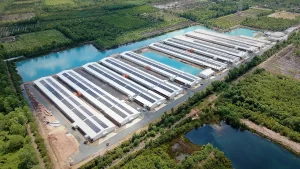
Manufacturing enterprises and power problems – Vietnam is considered the “world factory” in the near future, thanks to the strong development of the manufacturing industry. This has been proven by the increasing number of leading brands in the world interested in and planning to set up factories in Vietnam, in order to take advantage of the advantages in the manufacturing sector.
Vietnam’s manufacturing advantages include a young, skilled and well-trained workforce, along with competitive labor costs compared to many other countries in the region and the world. In addition, the Vietnamese government has also introduced many policies to support and encourage investment in the manufacturing industry, from cutting previously existing regulations to improving infrastructure and addressing labor market problems.
However, recently, manufacturing enterprises are facing power instability and continuous power cuts, especially in the Northern region between March and June 2023, significantly affecting production and export activities. These problems are caused mainly by two main factors: climate change and incidents at some coal-fired power plants. Climate change has created an unstable weather environment, negatively affecting the operation of hydropower plants. Irregular weather, heavy rains or droughts can increase water levels in dams, causing overcrowding or water shortages, which in turn affect power generation efficiency. Incidents at some coal-fired power plants in recent years have also caused power capacity outages in the northern region. These factors create difficulties in ensuring stable power supply for people and businesses, and hinder production activities in industrial zones. This makes finding solutions to stabilize power more urgent and necessary than ever.

Hoa Binh Hydropower closes units due to lack of water
The difficulties are difficult when production activities are already unstable due to energy supply, businesses also suffer from “no orders” or a sudden decrease in orders, creating dozens of problems in controlling costs and labor problems. The world inflation situation and the intense war in Europe have significantly impacted exports and production, causing a sharp drop in orders from key markets such as the United States and the EU. This sudden drop in orders requires manufacturers to face challenges in terms of sales and income.
Despite the challenges, for nimble businesses, this is also an opportunity for them to find innovative and transformational solutions to adapt to this difficult situation. This period can be seen as a lull for manufacturing businesses to focus on improving productivity and efficiency, optimizing processes and finding sustainable resources. Besides, businesses also need to pay attention and invest in ensuring stable energy supply. The use of sustainable energy sources such as rooftop solar will help businesses reduce the impact of production on the environment and avoid dependence on the “market” prices of traditional energy.

Manufacturing enterprises convert to rooftop solar
Read more: Power Development Plan VII: Priority for strong development renewable energy
Using rooftop solar power is a sustainable solution and offers many benefits over using unstable and environmentally unfriendly petroleum backup generation sources. First, installing rooftop solar systems allows factories to significantly save on electricity bills and reduce monthly electricity costs. Roof solar systems require no ongoing costs after the system has been installed (apart from periodic panel cleaning to ensure performance). Meanwhile, the use of backup generation sources with gasoline makes businesses dependent on gasoline prices in the market. In addition, the use of solar power is an environmentally friendly option because it contributes to reducing CO2 emissions to help businesses benefit from green production certifications. Meanwhile, the use of petroleum backup generation sources contributes to the increase in CO2 emissions and environmental pollution.
With more than 20 years of success in the field of solar power, Tona Syntegra Solar (TSS) is honored to be a reliable partner for investors and businesses who want to invest in converting to rooftop solar power. With a team of experienced experts in implementing complex solar power projects, TSS focuses on optimizing the performance and efficiency of each project, using advanced technology and conducting strict quality control to comply with fire protection regulations and other strict standards from investors.
According to the Organisation for Economic Co-operation and Development’s (OECD) latest Economic Outlook (6/2023), the economy has begun to improve despite a weak recovery. Global GDP is expected to moderate from 3.3% in 2022 to 2.7% in 2023, then rise to 2.9% in 2024. At the same time, the OECD expects inflation to fall from 9.4% in 2022 to 6.6% in 2023 and 4.3% in 2024.

These forecasts give us the right to expect a bright outlook for the economy next year – 2024. To prepare for the economic recovery and stay ahead of the wave of rising orders, manufacturers should implement a plan to measure and review plant resources and capacity. At the same time, make necessary transformations in production activities to benefit from new regulations related to the environment to control costs and increase the competitive advantage of businesses in the future.
Source: OECD Economic Outlook, Volume 2022 Issue 2